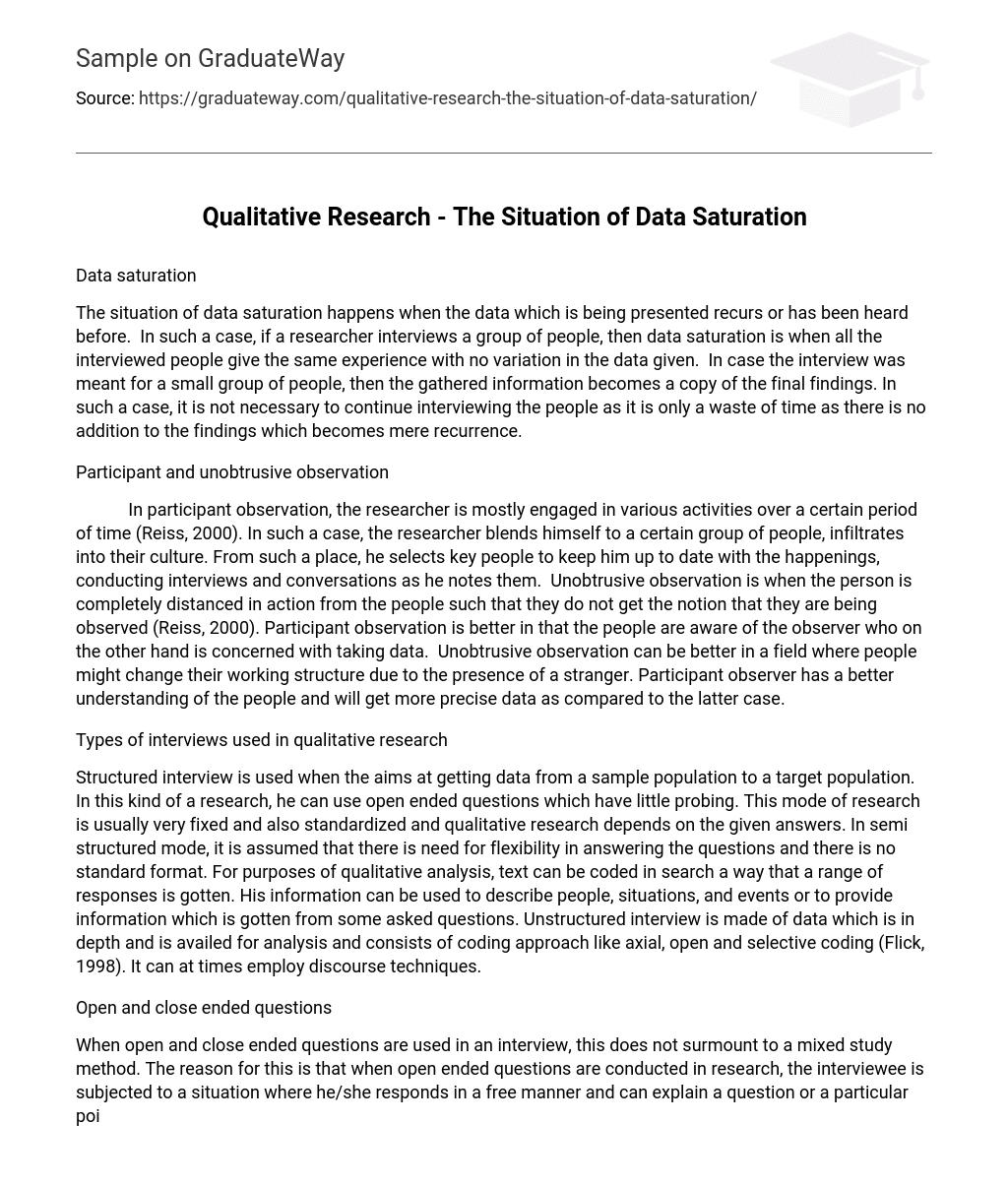Data saturation
The situation of data saturation happens when the data which is being presented recurs or has been heard before. In such a case, if a researcher interviews a group of people, then data saturation is when all the interviewed people give the same experience with no variation in the data given. In case the interview was meant for a small group of people, then the gathered information becomes a copy of the final findings. In such a case, it is not necessary to continue interviewing the people as it is only a waste of time as there is no addition to the findings which becomes mere recurrence.
Participant and unobtrusive observation
In participant observation, the researcher is mostly engaged in various activities over a certain period of time (Reiss, 2000). In such a case, the researcher blends himself to a certain group of people, infiltrates into their culture. From such a place, he selects key people to keep him up to date with the happenings, conducting interviews and conversations as he notes them. Unobtrusive observation is when the person is completely distanced in action from the people such that they do not get the notion that they are being observed (Reiss, 2000). Participant observation is better in that the people are aware of the observer who on the other hand is concerned with taking data. Unobtrusive observation can be better in a field where people might change their working structure due to the presence of a stranger. Participant observer has a better understanding of the people and will get more precise data as compared to the latter case.
Types of interviews used in qualitative research
Structured interview is used when the aims at getting data from a sample population to a target population. In this kind of a research, he can use open ended questions which have little probing. This mode of research is usually very fixed and also standardized and qualitative research depends on the given answers. In semi structured mode, it is assumed that there is need for flexibility in answering the questions and there is no standard format. For purposes of qualitative analysis, text can be coded in search a way that a range of responses is gotten. His information can be used to describe people, situations, and events or to provide information which is gotten from some asked questions. Unstructured interview is made of data which is in depth and is availed for analysis and consists of coding approach like axial, open and selective coding (Flick, 1998). It can at times employ discourse techniques.
Open and close ended questions
When open and close ended questions are used in an interview, this does not surmount to a mixed study method. The reason for this is that when open ended questions are conducted in research, the interviewee is subjected to a situation where he/she responds in a free manner and can explain a question or a particular point with no ordered manner (Taylor & Bogdan, 1998). Close ended interviews have the questions being asked responded to in an orderly manner. This means that both the issues apply to interviews only which are a method of data collection. On the other hand, mixed study methods combine both the methods used in data collection and research methods. In such a case data collection methods may vary from interviews, issue of questionnaires and such. Research methods cover areas like participatory research and unobtrusive research.
Effects of the qualitative researcher to the group being sampled
In qualitative research, it is very possible to influence the researcher has the ability to influence the dynamics of the group due to the fact that the researcher is the one who has power over how to influence the data collection methodology which will diverge the group to the choice that he wants. In cases of an interview, he knows of the questions to ask and so he will get the information that well suits him or even structure the questionnaires the way he wants to frame his findings (Taylor & Bogdan, 1998). In trying to avoid such effects, it becomes a little bit complicated owing to the fact that the qualitative researcher owns a very large part of the data and he is the sole person who can determine which data to deliver. The simplest way to try avoiding such, the responsibilities of the qualitative researcher can be shared with the quantitative researcher (Flick, 1998).
Preconception problems in qualitative research
During research, the researcher is not part of the data being collected when conducting the supposed research. In such a circumstance, his vital role is to get the information from his subjects it is possible though for him to have an idea which is why he should avoid the misconceptions for the validity of the data which he is sorting out (Reis, 2000). The prior idea is the part which makes it difficult to suspend the preconceptions as a certain person might give some wrong information knowingly which might force him to think of the real thing. The best way to avoid such possible circumstances is to ignore the comments which he thinks that he might have no idea of or just record the data as he receives it. The researcher can also try to avoid too much closeness with the subjects to avoid intervening in the explanations be it in an interview or questionnaires (Flick, 1998).
References
- Flick, U. (1998). An introduction to qualitative research. Thousand Oaks, CA.: SAGE Publications, Inc.
- Reis, H. T. & Judd, C. M. (eds.) (2000). Handbook of research methods in social and personality psychology. Cambridge, UK: Cambridge University Press.
- Taylor, S. T. & Bogdan, R. (1998). Introduction to qualitative research methods 3rd edition). New York, NY: John Wiley & Sons, Inc.





